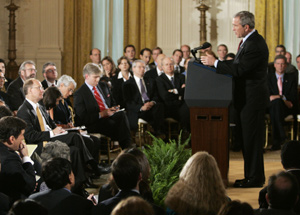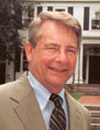
President Bush at a news conference in 2006. (AP photo)
 |
Giles urges TV reporters to ask tougher questions
COMMENTARY | January 12, 2007
TV has an edge over print in that it can take viewers along for the interview. But too often, writes the Nieman Foundation curator, American TV reporters accept evasive, reluctant answers without pressing for more. Why not follow the British model of tough interviewing?
This essay first appeared on the CBS News Web site “The Public Eye”
By Bob Giles
Bob_giles@harvard.edu
Not long ago, I was with a group of journalists looking at videotapes of a BBC reporter interviewing British Prime Minister Tony Blair. The reporter was clearly well informed and was aggressively pressing Blair when the prime minister’s answers seemed less than forthcoming. It was wonderful journalistic combat and highly informative for the audience.
BBC reporters routinely have opportunities to sit down with the prime minister for a face-to-face interview. The broadcasts, which can be seen and the transcripts reviewed online, come off as lively exchanges highlighted by sharp questions, occasional interjections by the reporter and relentless probing for clarity in the prime minister’s responses.
These interviews represent a striking contrast with the U.S. television, where there is an absence of spirited inquiry. Public officials are treated with courtesy, which is appropriate, but on balance are accorded far too many opportunities to respond to reporters’ queries without challenge. When the reporter fails to probe more deeply, he or she becomes simply an electronic stenographer providing the elected official or official spokesperson a video platform for getting out the message.
A recent CBS News Investigative Unit story offers a case in point. The story reported that billions of dollars spent on the Iraq War may have been lost to contractor waste, fraud and abuse. The story was based on a whistleblower lawsuit that had been obtained by CBS News.
In the segment, forthright and detailed comments were made during on-camera interviews with Sen. Patrick Leahy, D-Vt., who as new chair of the Senate Judiciary Committee plans to investigate how taxpayer dollars have been spent in Iraq, and Alan Grayson, a lawyer who has filed dozens of lawsuits against contractors.
The government response came from a “senior Justice Department official” who was not shown on camera and who was quoted indirectly as saying that it takes two to three years to investigate civil fraud cases and, even then, only about one in five meet the standards necessary for prosecution.
If the reporter challenged the official to respond more directly to the allegations, this was not shared with viewers, leaving the impression that the Justice Department got away with a non-response.
CBSNews.com posts videos and transcripts of its news shows, including the work of CBS News Investigates. The unit produces interesting and informative stories, yet there are few examples to be found of effective watchdog journalism where audiences can watch as a reporter presses an evasive or reluctant source.
This is not to single out CBS News. To one degree or another, each of the U.S. television news organizations seems reluctant to pose the hard questions and to probe for answers. As Dan Froomkin noted recently in his Washington Post White House Briefing column, “In contrast to the small-bore questions that American reporters posed to President Bush yesterday about his Iraq policy, two British journalists cut right to the central issue of the president’s credibility.”
Television’s great advantage is that it can take the viewer along for the interview. The audience can look into the eyes of the news source as he or she responds to the reporter’s queries. It is what sets TV news apart from print and radio news reporting. In an era when elected officials try to manipulate the news and spin it to their advantage, when they are able to speak anonymously or have hired spokespersons speak for them, this special role of television reporting as visual surrogate for the public is critical. The public knows that reporters who can be seen asking strong questions is one antidote to misinformation.
The premise here is that by failing to ask probing, penetrating questions routinely—indeed, to make that a signature characteristic of reporting on this medium—television news organizations are surrendering a distinct competitive advantage and depriving their audiences of information that spirited inquiry would yield.
Mass Media Machinery
Posted by
R C - Ra Conteur
02/44/2007, 04:45 PM
Unfortunately for some of us the mass media has lost so much credibility they have forfeited the the good part of American mindset. Thus we find commentary like this from political theorist Danilo Zolo:
"Parties no longer genuinely compete to attract the popular vote: instead, they collude with each other and establish client relationships with groups outside the political sphere. The electorate no longer possesses even that minimum level of political rationality needed to make the competitive model work. Their political experience is constructed for them by the mass media, which is most effective when not engaged in overt propaganda. The resulting system, Zolo argues, no longer deserves to be called a representative democracy: “liberal oligarchy” would be more accurate."
The American Political Science Review, Vol. 87, No. 4 (Dec., 1993), pp. 1004-1006
|





